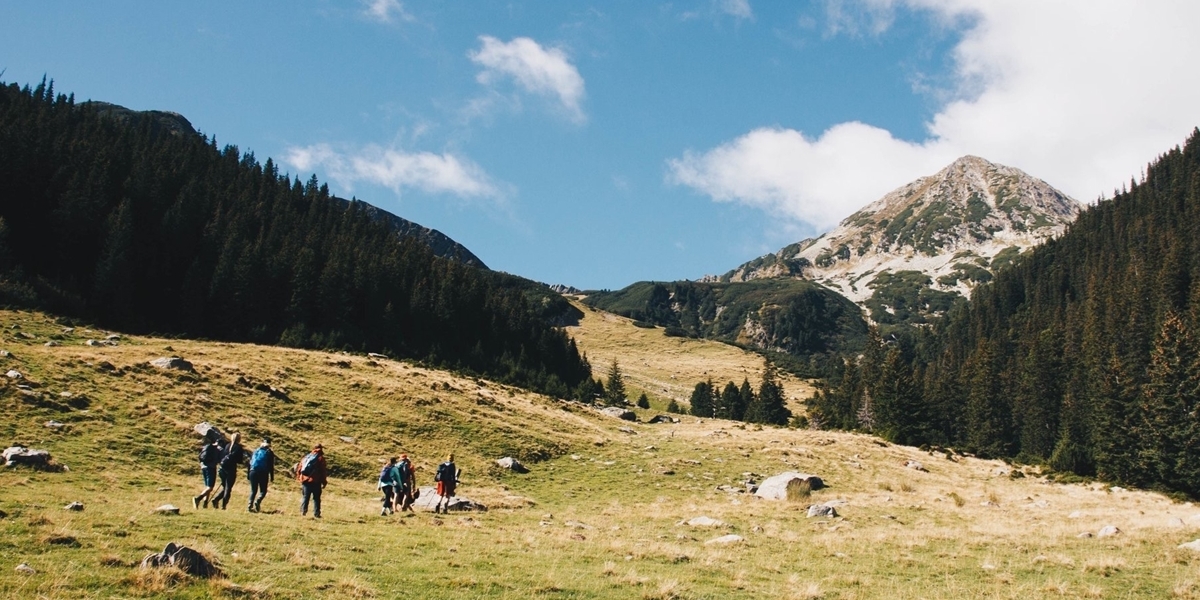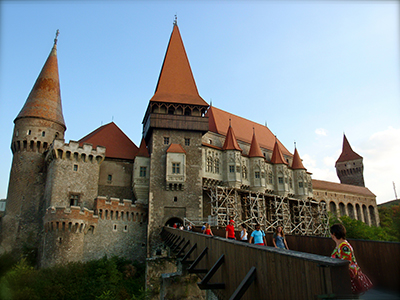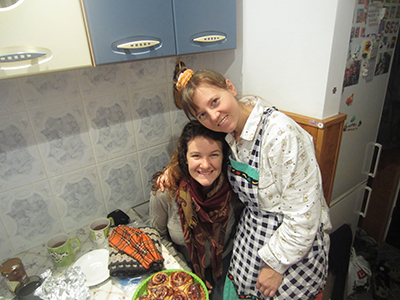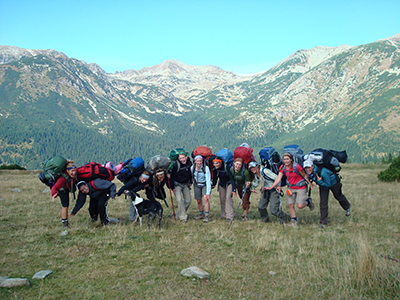
Romania Semester
Northwestern College's Romania Semester is a unique study abroad program in which you'll live and learn in a society still emerging from the impact of a communist dictator's brutal rule. Though communism fell in Romania in 1989, the country's people continue to struggle with civic and moral apathy, corruption and hopelessness. The New Horizons Foundation of Romania, which partners with NWC in offering the Romania Semester, was formed to teach Romanian youth self-confidence, teamwork and trust through adventure education programs and service-learning clubs.
During your semester in Romania, you'll participate in New Horizons' work as you learn about community development, experiential education and sustainable development—as well as Romanian culture, history and language. The program is group-oriented and includes excursions, home stays with Romanian families, and a mountain backpacking trip in an area of Romania known as one of the top backpacking destinations in Europe.
Application deadline for fall 2024 program:
NWC students: Feb. 10, 2024
Non-NWC students: May 1, 2024
As a participant in the Romania Semester, you'll take four courses and receive 16 credits upon completion of the program, which meets Northwestern Core (NWCore) cross-cultural engagement (CC) and language and culture (LA) requirements, as well as elective course equivalents in several majors. In addition, the semester fulfills the 16 elective credits of the cultural studies minor and may be a substitute for 4 credits and/or serve as one of the recommended immersion experiences of the Christian community development minor.
Romanian Culture and History (with Eastern Orthodoxy component) (4 credits)
While lectures and readings will provide the context for your learning in this class, your day-to-day life and interactions in the Jiu Valley and other regions of Romania are key components to your learning. This class will explore Romanian culture and history through visits to historic sites and museums, home stays with Romanian families, readings, and lectures. Lectures will focus on gaining insight into the historical and social development of Romania’s cultural values, especially the values communism attempted to propagate and the devastating wake left by the realities of this failed ideology. Exploring the social legacy of communism (low social capital, civic apathy and corruption) is imperative to understanding the work of New Horizons Foundation (adventure education and service learning as strategies for holistic youth development). There is also a substantial Eastern Orthodoxy component in this class, which serves to give Western students a good understanding of Eastern Orthodox faith, dogma, aesthetics, liturgies and lifestyle. Even though the Christian church started in the East, the Eastern Orthodox Church is largely unknown to Western audiences. There will be church visits and expert Orthodox authorities who will speak on behalf of their church, thus facilitating an authentic approach to Romanian Orthodoxy.
Romanian Language (4 credits*)
Did you know that Romanian is the closest living language to Latin—and thus is a bridge to all Romance languages? This class will allow students to develop basic Romanian vocabulary and grammatical structures so that they can successfully communicate. While lectures and readings will provide the context for your learning in this class, your day-to-day life and interactions in the Jiu Valley and other regions of Romania are key components of your learning. This class will explore the basics of the Romanian language and will equip you to manage life in Lupeni with basic Romanian language skills. Not only will you be able to order food at a restaurant, have a basic conversation in Romanian with your host family, and be able to get to know some IMPACT kids (New Horizons service-learning clubs) in a second language, but you will also understand the cultural concept of language and the importance it makes in culture. Through learning and observing, you will understand more deeply that language is not simply a neutral construct but instead is a living organism.
* This class covers the entire language requirement for Northwestern students.
Experiential Education for Community Development and Youth Ministry (4 credits)
Want to safely take a group into the wilderness on a backpacking adventure? Want to lead effective team-building activities and debriefs? Want to take your youth group to the next level and get them involved in community action? This class builds off the renowned youth and community development programs of the New Horizons Foundation, which pioneered both outdoor/adventure education and service learning in Romania. You will learn—by doing—and develop your leadership skills through a backpacking trip in beautiful Retezat National Park, as well as by working with Romanian youth in the context of the IMPACT service-learning clubs that are spreading around the world (powered by, among others, World Vision). Besides the practical aspects, you will dig deeply into the theoretical foundations of experiential education, including the classical virtue and “wisdom” (phronesis) tradition rooted in Aristotle, as well as experiential education’s later refinements with Kurt Hahn and John Dewey.
Sustainable Development (4 credits)
Why are some countries poor and others rich? Is wealth only or primarily about economic development? What does conceiving of development primarily in economic terms mean for the future of the planet? If development is more than increasing incomes, what is it? And how can it be measured? What is poverty and well-being/flourishing anyway? These and other questions will be addressed in this class on sustainable development. Special reference will be given to the theoretical aspects of various paradigms of human well-being: social capital and civil society, the human development paradigm (the Capability Approach of Amartya Sen that informs the United Nations’ work), basic needs, geographical (Jared Diamond), and Marxist-inspired communism. There will be considerable focus and care given to motivating students to 1) care about issues of global poverty and why these are central to the Christian ethos; and 2) think critically about poverty and human development via resources both from within and outside the Christian faith.
Northwestern's Global Education Center staff will book airline tickets to Bucharest, Romania, making arrangements that in most cases will allow student to fly together as a group. Northwestern students will receive a $1,200 stipend to be used for airfare. Non-Northwestern students will be responsible for paying for their airline tickets. Generally, all in-country transportation costs will be covered by the program or via a per diem.
The program fee for the Romania Semester is the same as Northwestern's on-campus semester costs (tuition/room/board). Included is tuition for 16 credits, in-country transportation, housing/home stays, most meals or meal per diem expenses, orientation, and all program excursions and retreats. You will need to cover airfare, the cost of books (an estimated $100 to $150), your passport and passport photo, required wilderness excursion gear, immunizations/vaccines, international insurance, and individual travel and spending money, among other items.
All applicable Northwestern College financial aid applies. Northwestern students receive a $1,200 stipend to be used toward airfare. Contact Northwestern's Global Education Center for more information.
Upon acceptance into the program, a $250 deposit (cash or check made payable to Northwestern College) will be required to hold your spot. This deposit will be applied to the final program fee.
Once you are accepted into the Romania Semester—and before you can travel to Romania—you will need a passport if you are a U.S. citizen. You are responsible for applying for and obtaining your own passport. American citizens are allowed to visit Romania without a visa for a total of 90 days within six months from their arrival. The program will assist with obtaining a temporary residency permit (permis de sedere) once you are on site. For more information, please contact Northwestern's Global Education Center. Complete information on entry and exit requirements for Romania are also available on the website of the U.S. Embassy in Romania.
The Centers for Disease Control recommends that all travelers to Romania be up-to-date on routine immunizations. The Romania Semester program requires that you have up-to-date tetanus and diphtheria (Td) vaccinations and that you receive the Hepatitis A (Hep A) vaccine. Other immunization decisions should be made in consultation with your personal physician. Please plan ahead and visit your doctor at least six weeks prior to departure, as certain immunizations require several visits or need several weeks to take effect. Specific health threats for visitors to Romania and Eastern Europe include traveler's diarrhea, among others. For more information, visit the Centers for Disease Control and Prevention website.
You must purchase separate international travel insurance that will provide basic, medical, medical evacuation and repatriation coverage (approximately $120). The Global Education Center will make the actual purchase when all payments are received. Insurance will cover you from the day of your departure to the day of your return.
An International Student Identity Card—which provides discounts for travel, insurance and various goods—is available for purchase from Northwestern's Global Education Center.
Northwestern College sophomores, juniors and seniors with a minimum GPA of 2.5 are eligible to apply. This program is also available to non-NWC students on a space-available basis.
You must complete all pre-departure requirements to participate in the Romania Semester. This includes attending the pre-departure orientation. There are no exceptions. Further information and orientation dates will be provided and confirmed upon acceptance into the program.
- Application for NWC students (must be logged into MyNWC)
- Application for non-NWC students
- Non-NWC students must fill out a guest application to Northwestern and be accepted before applying to the Romania Semester program.
Applications won't be considered complete until ALL sections of the online application are completed and all other required documents and reference/recommendation letters are submitted. The application deadline is Feb. 10 for Northwestern students and May 1 for non-NWC students.
You should review your answers carefully to ensure the accuracy of your application, You can't edit your application once it is submitted.
- Romania Semester photo gallery
- Romania Semester brochure
- Letter from program director Dana Bates
- Video about the Viata program of New Horizons Foundation
- Romanian language information
Global Education Center
global@nwciowa.edu
712-707-7225

 Romania is a country of great contrasts and paradoxes—full of great beauty, rich mythology and hard truths. It is a land of majestic mountains, medieval castles and the legend of Dracula. And yet, in the Jiu Valley, the depressed coal-mining region that serves as the base for the Romania Semester, one sees firsthand the devastating effects of communism.
Romania is a country of great contrasts and paradoxes—full of great beauty, rich mythology and hard truths. It is a land of majestic mountains, medieval castles and the legend of Dracula. And yet, in the Jiu Valley, the depressed coal-mining region that serves as the base for the Romania Semester, one sees firsthand the devastating effects of communism.
 Dana Bates
Dana Bates
 During the Romania Semester, you'll spend part of your time living with Romanian host families—one of the best ways to experience local culture and language. When not living with a host family or on a retreat, you'll be housed in dormitory-style housing provided for by the program. Generally, all meals will be provided either by your host family or the program (via a per diem or through group meals). You'll camp and join other Romania Semester participants in making your own food during the Retezat National Park backpacking trip.
During the Romania Semester, you'll spend part of your time living with Romanian host families—one of the best ways to experience local culture and language. When not living with a host family or on a retreat, you'll be housed in dormitory-style housing provided for by the program. Generally, all meals will be provided either by your host family or the program (via a per diem or through group meals). You'll camp and join other Romania Semester participants in making your own food during the Retezat National Park backpacking trip. In addition to a backpacking trip in beautiful Retezat National Park, you'll enjoy a variety of sightseeing trips. Typical destinations include Hunedoara Castle, a monastery in Prislop, and Timisoara, Cluj-Napoca and Bucharest.
In addition to a backpacking trip in beautiful Retezat National Park, you'll enjoy a variety of sightseeing trips. Typical destinations include Hunedoara Castle, a monastery in Prislop, and Timisoara, Cluj-Napoca and Bucharest.